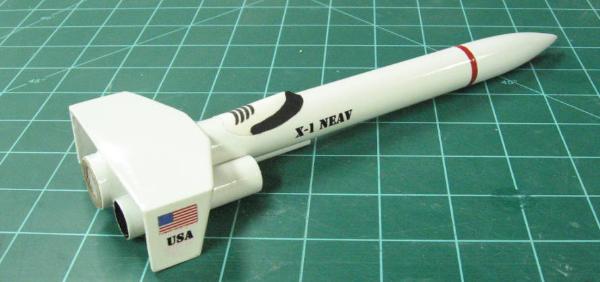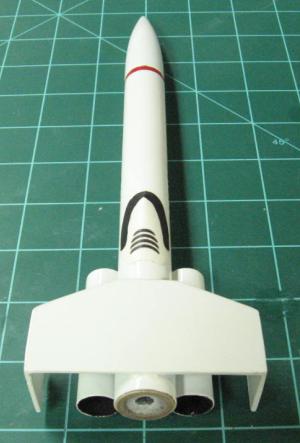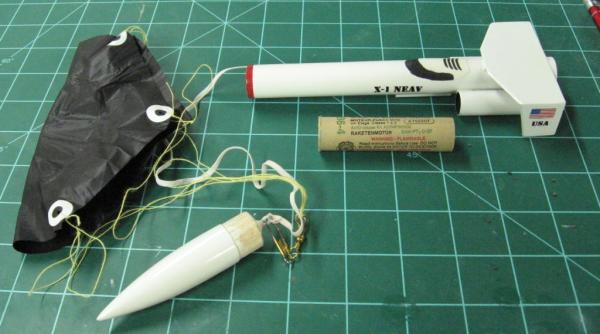Cygnus Rocketry Near Earth Attack Vehicle (N.E.A.V.)
Cygnus Rocketry - Near Earth Attack Vehicle (N.E.A.V.) {Kit}
Contributed by Nicholas Berring
| Construction Rating: | starstarstarstar_borderstar_border |
| Flight Rating: | starstarstarstar_borderstar_border |
| Overall Rating: | starstarstarstar_borderstar_border |
| Manufacturer: | Cygnus Rocketry  |
Brief:
This is a clone of Model Rocket Newsletter plan of the month called the "Top Secret". Single-stage
combination wing/fin and tube stabilization.

Construction:
Contents: 1 BT-20 body tube, 2 BT-5 "engine tubes", balsa nose cone, fishing swivel, screw eye, 6"
parachute and thread shrouds, 17" long (before installation) 1/8" elastic shock cord, engine block, no engine
mount or motor hook (minimum diameter tube for 18mm), cardstock set for fin alignment, shock cord mounting, and canopy,
1/8" launch lug, laser cut 1/16" balsa fin set, lead weight, and 3/16" furniture dowel.
The included instructions are three 8.5" x 11" pages with few simple yet clear illustrations. A fourth sheet is a copy of the Model Rocket Safety Code with suggested launch field sized for various engines. Assembly sequence was followed (with the exception of item 2 below), and it was easy to create a model that is structurally sound and flyable. There are a few tricky spots that may prevent one from making a really great and well-finished model.

- Leave off the rear wing until after painting. There is absolutely no way to properly paint the underside of that wing with rattle-can spray paint with the BT-5 engine tubes and rudders on there. To make a really slick model, it is necessary to do some priming, sanding and painting before step 5. Remember to then scrape the paint off of the areas to be glued later.
- Step 7 in my instructions does not accurately represent items in the kit. There is a 3/16" furniture dowel provided to insert into a hole in the base of the nose cone. This is presumably to accept the screw eye as the dowel has a tiny hole drilled in the center of one end. Giving it harder wood to bite into should prevent it from ripping out of the balsa nose cone. Neither this dowel nor its function are not mentioned in the kit instructions. I adapted in the following way: Do not try to glue the lead disks into the nose cone base as the instructions say. Take the lead disks and cut them up into little pieces. Better yet, measure out an equivalent weight of lead shot. Instead of using the entire length of dowel in the underside of the nose cone (it is quite long), cut it in half. Pack the space at the bottom of the hole in the nose cone with the lead. Then glue the dowel in on top to hold everything in. It need not be flush, my dowel sticks out about 1/4"
- The parachute material on mine was a bit heavy and colored black (hard to see). I'd try cutting a new one from an easier-to-see material, anything but black.
Finishing:
PROs: I really like the way this rocket looks. The pictures on my favorite retailer's website drew me in and I had to
have one. One caution, it looks bigger than it really is. It is correctly advertised, but its proportions just make it
look big and sleek. I was a little surprised to see the finished size.
CONs: Shoot the decals with a clear coat or clear decal film from the Testor's decal printing kit before trying to apply them. Mine were fragile. Dress up the canopy outlines with paint. The one I got was a crappy photo enlargement or low resolution printer copy and the edges of the black windscreen were fuzzy and pixelated. Grab a fine brush and some black paint to even things out. My nose cone was rough and had a knot hole in it that required moderate filling and sanding before paint.
Construction Rating: 3 out of 5
Flight:
The launch was on an A8-3 and the parachute shrouds got fouled in the wing. Half the wing was ripped away and lost. I
hesitate to blame this on the model design, because the boost off the pad was a little slow and the flight was wobbly.
It needs more engine than I used. When I fix it I plan to try a B4-4.
Recovery:
Shock cord technique was the classic folded paper patch method. No Kevlar®
was supplied.

Flight Rating: 3 out of 5
Summary:
Main PROs: Interesting/obscure/uncommon subject. Looks really cool on a display stand.
Main CONs: Kit contents do not match instructions. Painting around the wing.
Overall Rating: 3 out of 5
Other Reviews
- Cygnus Rocketry Near Earth Attack Vehicle (N.E.A.V.) By Ron Wirth (September 2, 2009)
Brief: The N.E.A.V. X-1 from Cygnus Model Rocketry Company is a small futuristic design that reminds me of something that you might see in the pod races from the film Star Wars Episode I: The Phantom Menace . I was not familiar with the company when I came across the rocket kit at Uncle Mike's Rocket Shack and decided to add it to my order. The rocket kit comes in a large plastic bag ...
 |
 |
Sponsored Ads
 |
 |










T.P. (September 16, 2009)